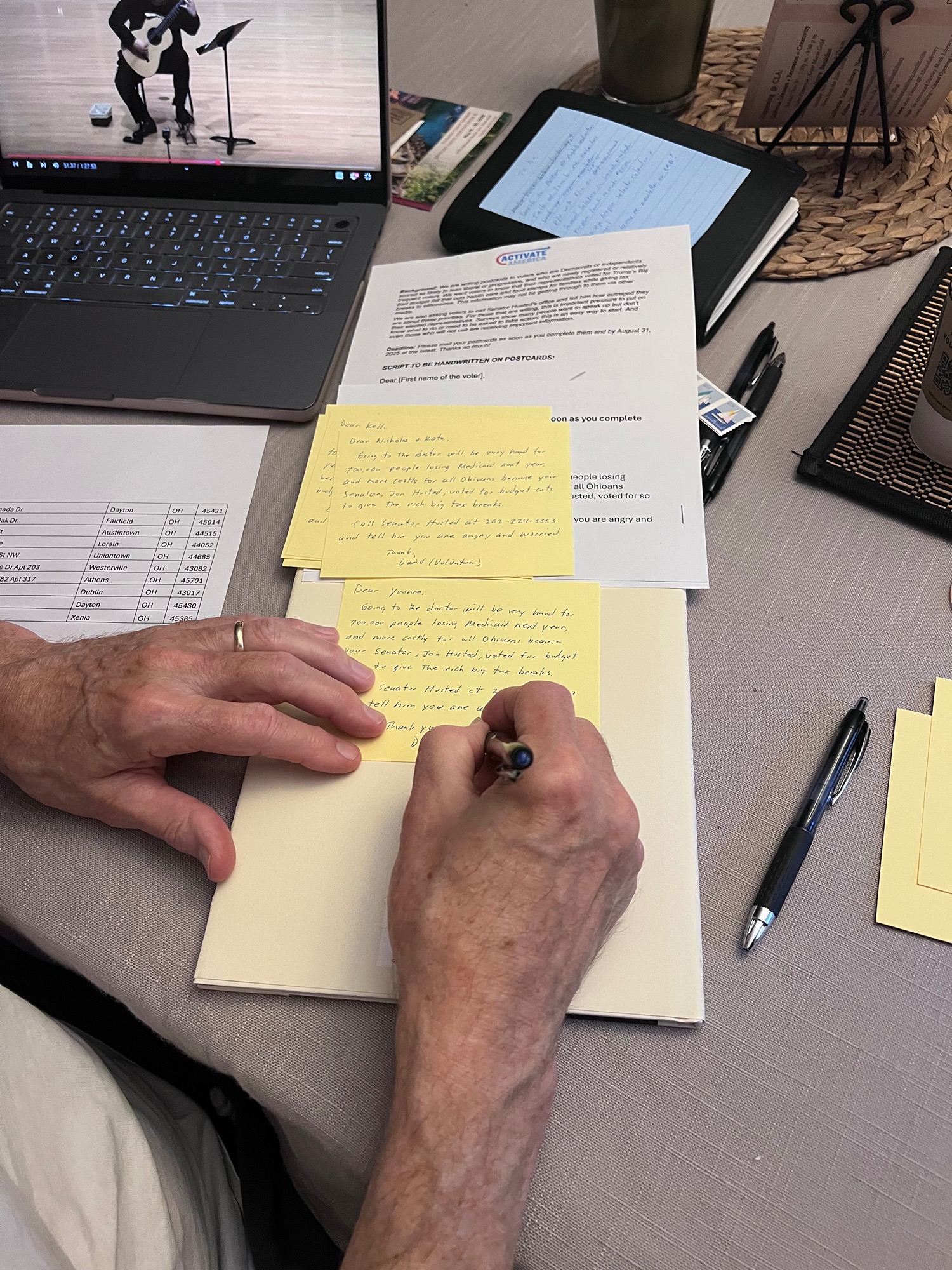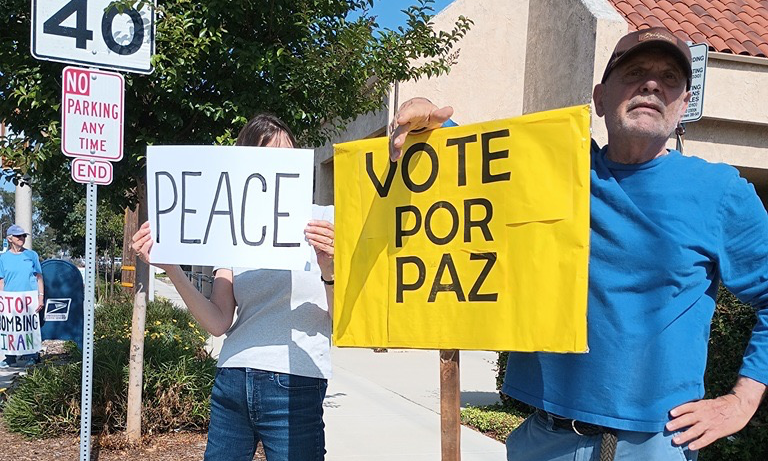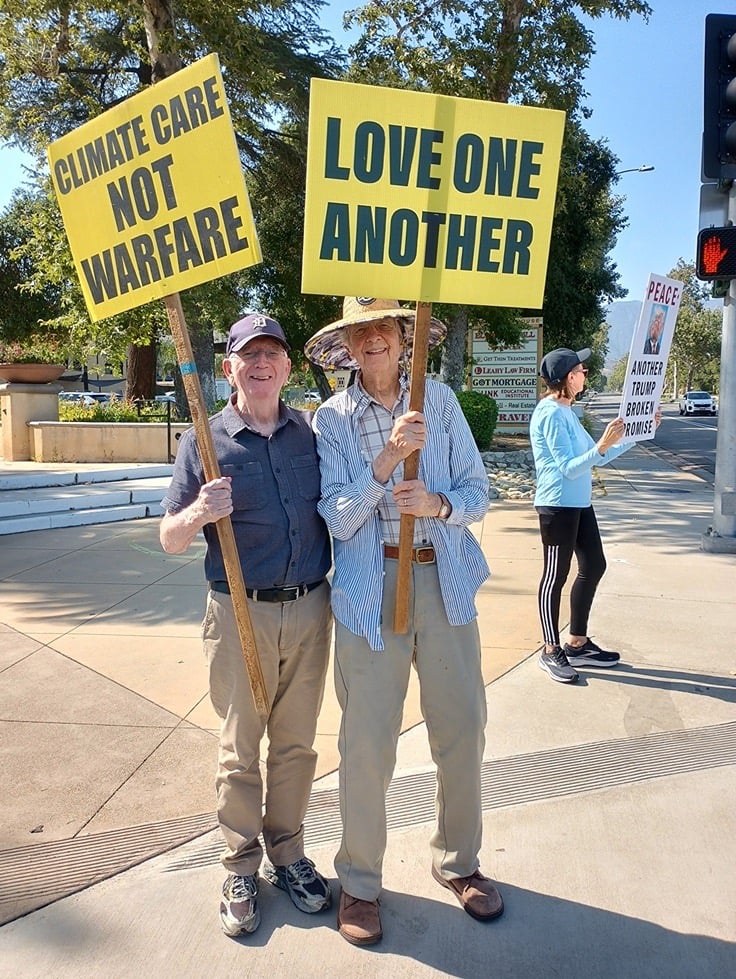Ongoing Opportunities for Involvement
Justice Groups' members coordinate regular actions on and near the Pilgrim Place campus. We welcome your participation. If additional details are needed, please contact us.

Postcard Writing
SAVE DEMOCRACY ACTION GROUP Postcard Writing Project is planned to resume in January 2026! Please see this month's Calendar for more details.
Monday Mornings at Pilgrim Place's Napier Center, from 10:15 am - 12 noon

Permanent Ceasefire Street Action
Peaceful protest against the ongoing violence in Gaza. Join us to express your desire for peace in Palestine and beyond.

Peace Vigil
This longstanding action of Pilgrim Place residents against war and injustice worldwide has been held weekly for more than 30 years.
Seeing ICE Activity? Know Your Rights!
With thanks to ICE Out of Pomonal, Justice for Immigrants Seeking Asylum, and Indivisible Inland Valley for a very informative 'Know Your Rights' workshop in June, we were reminded that preparation can turn our good intentions into action. In an ICE interaction, your role as a bystander can make a difference, even when it is limited to observing and documenting. Interfering with ICE activity can lead to criminal charges, including obstruction of justice, aiding and abetting, or harboring. You must remain at a safe distance and not physically obstruct or interfere with the ICE agents. Here's what you can do:
1. Document the encounter. If it feels safe, use your phone to film the encounter, focusing on the actions of the ICE agents. Write down the officers' names and badge numbers, the location, time, and any other relevant details. Avoid posting details on social media until they have been verified.
2. Know your rights and remind others of theirs. Remind the person being arrested that they have the right to remain silent.Encourage them to ask for an attorney, as they have the right to legal representation. Remind them they have the right to refuse a search of themselves or their belongings (including their purse or wallet, phone, computer, and their home and documents) unless officers have probable cause or a valid warrant.
3. Provide information and assistance to the person being arrested. Ask the person being detained if they have an immigration lawyer or family member you can call. Share information about immigrant rights organizations or rapid response hotlines that can provide legal assistance and support.
4. Consider reporting the incident. Reach out to local rapid response networks or immigrant rights organizations to report the incident and seek guidance. OUR LOCAL RAPID RESPONSE HOTLINE IS (909) 361-4588. If you believe misconduct occurred, consider filing a complaint with the appropriate agency or your local ACLU.
Important Considerations
Safety first: Always prioritize your safety and the safety of the person being arrested.
Do not interfere: Do not physically resist or obstruct the ICE agents, as this can have serious legal consequences.
Know your rights: Be aware of your rights as a bystander and the rights of the person being arrested. ACLU's summary and video may be helpful.
Act calmly: Stay calm and do not argue with or resist the officers.

Your Rights When Attending a Protest
As summarized by the ACLU:
Your rights are strongest in what are known as “traditional public forums,” such as streets, sidewalks, and parks. You also likely have the right to speak out on other public property, like plazas in front of government buildings, as long as you are not blocking access to the government building or interfering with other purposes the property was designed for.
Private property owners can set rules for speech on their property. The government may not restrict your speech if it is taking place on your own property or with the consent of the property owner.
Counterprotesters also have free speech rights. Police must treat protesters and counterprotesters equally. Police are permitted to keep antagonistic groups separated but should allow them to be within sight and sound of one another.
When you are lawfully present in any public space, you have the right to photograph anything in plain view, including federal buildings and the police. On private property, the owner may set rules related to photography or video.
You don’t need a permit to march in the streets or on sidewalks, as long as marchers don’t obstruct car or pedestrian traffic. If you don't have a permit, police officers can ask you to move to the side of a street or sidewalk to let others pass or for safety reasons.
What to do if you believe your rights have been violated:
When you can, write down everything you remember, including the officers' badge and patrol car numbers and the agency they work for.
Get contact information for witnesses.
Take photographs of any injuries.
Once you have all of this information, you can file a written complaint with the agency's internal affairs division or civilian complaint board.
If stopped by the police while protesting:
Stay calm. Make sure to keep your hands visible. Don't argue, resist, or obstruct the police, even if you believe they are violating your rights. Point out that you are not disrupting anyone else's activity and that the First Amendment protects your actions.
Ask if you are free to leave. If the officer says yes, calmly walk away.
If you are under arrest, you have a right to ask why. Otherwise, say you wish to remain silent and ask for a lawyer immediately. Don't say anything or sign anything without a lawyer.
You have the right to make a local phone call, and if you're calling your lawyer, police are not allowed to listen.
You never have to consent to a search of yourself or your belongings. If you do explicitly consent, it can affect you later in court.
Police may "pat down" your clothing if they suspect you have a weapon and may search you after an arrest.
Police officers may not confiscate or demand to view your photographs or video without a warrant, nor may they delete data under any circumstances. However, they may order citizens to cease activities that are truly interfering with legitimate law enforcement operations.
What to do if you believe your rights have been violated:
When you can, write down everything you remember, including the officers' badge and patrol car numbers and the agency they work for.
Get contact information for witnesses.
Take photographs of any injuries.
Once you have all of this information, you can file a written complaint with the agency's internal affairs division or civilian complaint board.